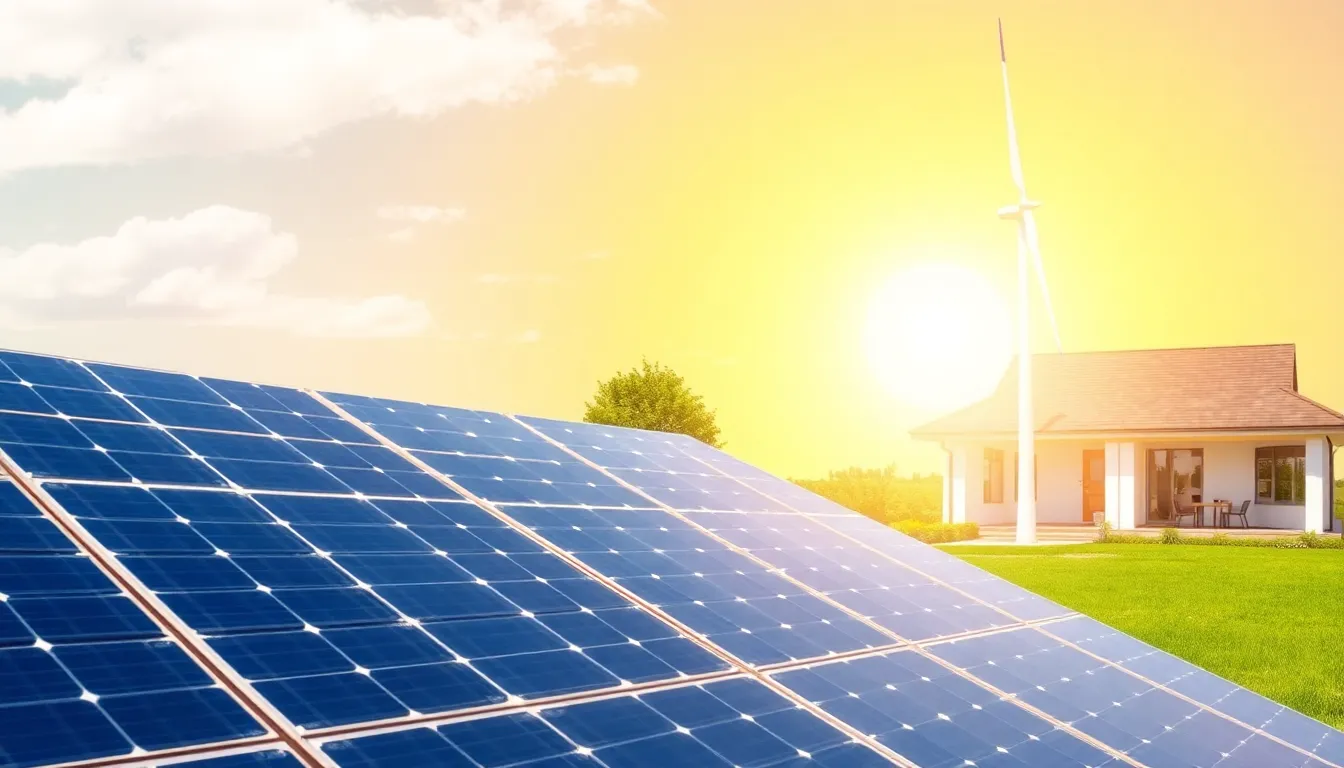In a world where gadgets seem to multiply faster than rabbits, the quest for environmentally friendly tech has never been more crucial. Imagine a life where your smartphone doesn’t just connect you to friends but also helps save the planet. Sounds like a sci-fi dream, right? Well, it’s not! Eco-conscious innovations are popping up everywhere, making it easier than ever to go green without sacrificing style or functionality.
From solar-powered chargers to energy-efficient appliances, the tech industry is stepping up its game. It’s like the Avengers of the gadget world, fighting climate change one device at a time. So, if you’re ready to upgrade your life while giving Mother Earth a high-five, dive into the exciting realm of eco-friendly technology. Who knew saving the planet could be this cool?
Table of Contents
ToggleOverview of Environmentally Friendly Tech
Environmentally friendly technology focuses on reducing environmental impact while maintaining functionality. Significant advancements include solar-powered chargers that harness sunlight for power. These devices exemplify how eco-conscious design meets everyday needs. Energy-efficient appliances reduce electricity consumption and lower utility bills, making them appealing to consumers.
Electric vehicles represent another innovation in the realm of green tech. They produce zero tailpipe emissions and utilize electricity from renewable sources. Many cities now offer charging stations, making electric car ownership more practical.
Smart home technology allows users to monitor and manage energy use efficiently. Devices like smart thermostats enable precise control over heating and cooling, optimizing energy consumption. Integrating these technologies into daily life leads to a noticeable reduction in carbon footprints.
Recycling initiatives and sustainable materials are also critical components of eco-friendly tech. Manufacturers increasingly use recycled plastics and biodegradable elements to create products with lesser environmental burdens. Their efforts help alleviate the stress on landfills and promote sustainability.
Tech companies are now prioritizing renewable energy sources for production and operations. Various brands commit to achieving net-zero emissions within the next few decades. This commitment fosters a sense of accountability and promotes a greener future.
Leaders in the tech industry continue to innovate, proving that environmentally friendly solutions are attainable and necessary. Innovations contribute to an enjoyable lifestyle while addressing pressing global environmental challenges. Each step toward greener technology illustrates the ongoing shift toward sustainability in everyday consumption.
Types of Environmentally Friendly Tech

Innovations in environmentally friendly tech come in various forms, each contributing uniquely to a sustainable future. This section explores three key types of eco-friendly technologies: renewable energy solutions, sustainable materials, and energy-efficient devices.
Renewable Energy Solutions
Solar panels generate electricity through sunlight, reducing reliance on fossil fuels. Wind turbines convert wind energy into power, promoting clean energy production. Geothermal systems utilize the Earth’s heat, providing efficient heating and cooling options. Each renewable energy solution minimizes greenhouse gas emissions and supports energy independence, allowing households and businesses to lower their environmental footprints.
Sustainable Materials
Manufacturers increasingly use sustainable materials, like bamboo and recycled plastics, promoting eco-friendly manufacturing processes. Biodegradable components help reduce pollution, while products made from reclaimed wood prevent deforestation. Companies now prioritize responsible sourcing, ensuring that materials do not harm ecosystems. Sustainable packaging options also minimize waste, reflecting growing consumer demand for environmentally conscious alternatives.
Energy-Efficient Devices
Energy-efficient appliances significantly lower energy consumption while maintaining functionality. Smart thermostats optimize heating and cooling schedules, fostering energy savings without sacrificing comfort. LED bulbs provide longer lifespans and consume less energy compared to traditional lighting options. Devices such as Energy Star-rated refrigerators and washing machines demonstrate efficient designs that reduce overall electricity bills while benefiting the environment.
Benefits of Environmentally Friendly Tech
Environmentally friendly technology offers numerous advantages. Its positive effects encompass both the environment and economic sectors.
Environmental Impact
Sustainable tech innovations significantly reduce carbon footprints. Renewable energy solutions, like solar panels, decrease reliance on fossil fuels. By utilizing these sources, businesses and individuals contribute to cleaner air and water. Additionally, eco-friendly materials minimize waste and pollution. When companies adopt recycling initiatives, they combat landfill overflow and promote resource conservation. Notably, electric vehicles generate zero tailpipe emissions, making urban areas healthier. As these advancements proliferate, the ongoing benefits multiply, creating a more sustainable future.
Economic Advantages
Cost savings manifest through the adoption of energy-efficient devices. Smart thermostats, for example, optimize energy use, which lowers utility bills. Over time, these savings can reach significant amounts for households and businesses alike. Many eco-friendly products qualify for government incentives or rebates, boosting financial benefits. Investment in renewable energy also creates jobs in manufacturing and installation sectors. As companies prioritize sustainability, they enhance their public image, attracting eco-conscious consumers. Ultimately, these economic advantages pair with environmental benefits, illustrating the dual value of environmentally friendly tech.
Challenges in Adoption
Adopting environmentally friendly technology presents several challenges that hinder widespread implementation.
Cost Considerations
High initial costs often deter consumers from purchasing eco-friendly products. Electric vehicles, while offering long-term savings, typically come with a higher upfront price than conventional options. Solar panels, another example, require significant investment despite their potential for savings over time. Government incentives can counterbalance these expenses, making them more accessible. Companies also face financial challenges when investing in sustainable materials and renewable energy sources. Awareness of these economic factors influences both consumer behavior and corporate decisions.
Technological Limitations
Technological limitations also play a critical role in the adoption of green innovations. For instance, the availability of efficient energy storage solutions impacts the effectiveness of renewable energy systems. Some electric vehicles lack adequate charging infrastructure, which creates barriers for potential users. Not all smart home devices seamlessly integrate with existing systems, leading to compatibility issues. Additionally, the lifespan of sustainable materials can be shorter than traditional alternatives, raising concerns about durability. Addressing these limitations remains essential for fostering a greater acceptance of environmentally friendly technology.
Embracing environmentally friendly technology is not just a trend; it’s a necessity for a sustainable future. As innovations continue to evolve, consumers have more options than ever to integrate eco-conscious choices into their lives. These technologies not only help reduce environmental impact but also enhance everyday convenience and style.
While challenges exist in widespread adoption, the benefits far outweigh the hurdles. With ongoing advancements and increased awareness, the shift towards greener tech solutions is becoming more achievable. By making informed choices, individuals can contribute to a healthier planet while enjoying the perks of modern technology. The journey towards sustainability is a shared responsibility, and every step counts.






